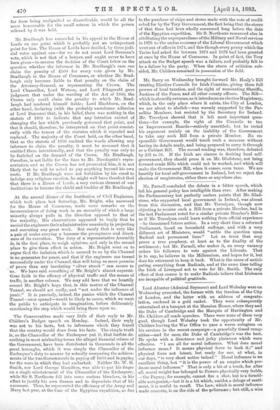Lord Alcester (Admiral Seymour) and Lord Wolseley were on Wednesday
presented, the former with the freedom of the City of London, and the latter with an address of congratu- lation, enclosed in a gold casket. They were subsequently entertained at a banquet at the Mansion House, where they and the Duke of Cambridge and the Marquis of Hartington and Mr. Childers all made speeches. These were none of them very good, though Lord Wolseley took the opportunity of Mr. Childers leaving the War Office to pass a warm euloginm on his services in the recent campaign—a gracefully timed recog- nition—and for once, the Dake of Cambridge's was the best. He spoke with a directness and jerky plainness which were effective. " I am all for moral influence. What does moral influence mean P It means physical force to back it;" and physical force not latent, but ready for use, at what, in our days, " is very short notice indeed." Moral influence is an excellent thing, but " it is the power of an empire which pro- duces moral influence." That is only a bit of a truth, for after all, moral weight has belonged to Powers physically very feeble, —the Papacy, for example, cannot fire a shot, but is'a formid- able autagonist,—but it is a bit which, amidst a deluge of senti- ment, it is useful to recall. The Law, which is moral influence made concrete, is on the side of the policeman ; but still, a wise
Commissioner picks six-foot candidates, and prefers that they be plucky.



































 Previous page
Previous page